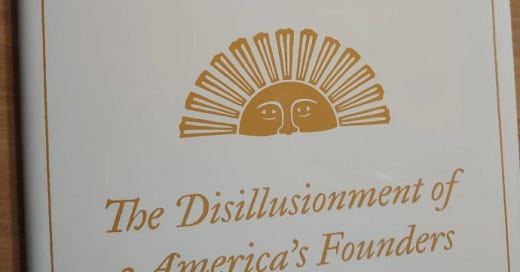The Founders’ Fears
Many of America's founding fathers lost faith in the country they fought so hard to create
We all have our doubts, and so did America’s Founding Fathers.
Fears of a Setting Sun: The Disillusionment of America’s Founders, a recent book by Dennis C. Rasmussen, examines precisely what the title describes. But it’s not as depressing as it sounds.
The bulk of the book focuses on four key founders and the major doubts they experienced later in life. George Washington feared the rise of partisanship. Alexander Hamilton worried that the government wasn’t vigorous enough. John Adams, the first to become disillusioned, didn’t think people were virtuous enough to sustain the republic. Thomas Jefferson, highly optimistic for a long time, eventually came to dread that slavery would tear the country apart.
Each one, as well as other founders, became disillusioned about the United States’ ability to endure. Though they all sacrificed much to give the new country the best possible chance, they were increasingly doubtful they had built something that would last.
Given the serious issues that plagued the young nation throughout the late eighteenth and early nineteenth centuries—tensions with France, the War of 1812, slavery, and so much more—how could they not have doubts?
An excess of certainty can often be creepy, so, in a strange way, it’s reassuring to see how these important historical figures understood their own limitations. They all knew that perfection was unattainable, so they instead aimed for something that might work despite its faults. But there was no way of knowing that it actually would work, and certainly not for 230+ years and counting.
Rasmussen closes his book by focusing on a fifth founder, James Madison, who survived until 1836, allowing him to witness close to half a century of the Constitution in action, withstanding all sorts of challenges from various directions decade after decade. And though not free of doubts himself, Madison remained generally optimistic about America’s prospects.
“[Madison] did occasionally harbor some real worries and experience some palpable disappointments, as might be expected, but these concerns were never so deep or lasting as to lead to disillusionment with the political order as a whole or to despondency about its future,” Rasmussen writes.
Rasmussen speculates about why Madison was the exception to the rule, citing temperament as one likely explanation. But another was that he “had lower expectations than most of the other founders regarding what was politically possible, and he pointedly refused to let the perfect be the enemy of the good.”
Madison was a realist, even more so than the other founders. He understood partisanship was going to happen and that men were not angels, and he held more balanced views about centralization and decentralization of power than Hamilton and Jefferson.
The most appealing reason Rasmussen puts forth, however, is Madison’s longevity.
“Long experience had, moreover, persuaded Madison beyond a doubt that the American form of government was preferable to the alternatives—throughout history and around the world—and he sought to convince (or remind) his fellow citizens of that basic but crucial fact,” Rasmussen writes.
The fact that Madison was a participant or at least an interested observer throughout decades of turbulent situations, and yet still died confident about America’s future, inspires hope.
Rasmussen quotes Madison’s final advice to U.S. citizens: “The advice nearest to my heart and deepest in my convictions is that the Union of the States be cherished & perpetuated. Let the open enemy to it be regarded as a Pandora with her box opened; and the disguised one, as the Serpent creeping with his deadly wiles into Paradise.”
I never expected a book about disillusionment to be so uplifting. It’s worth a read.
Daniel Sherrier is a writer living in central Virginia. A William & Mary graduate, he worked for community newspapers for nearly a decade as a reporter and then an editor. He is the author of the superhero novels The Flying Woman and The Silver Stranger, and he overthinks stories and writing on his own Substack. He is NOT a historian, but loves reading about history and sharing interesting books.






